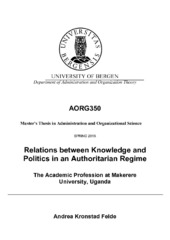Relations between Knowledge and Politics in an Authoritarian Regime. The Academic Profession at Makerere University, Uganda
Master thesis
Permanent lenke
https://hdl.handle.net/1956/18781Utgivelsesdato
2018-06-28Metadata
Vis full innførselSamlinger
- Department of Government [443]
Sammendrag
The research design for the following study is an exploratory, qualitative case study. It is a case of the Academic Profession at Makerere University in Uganda and explores and aims at understanding the relationship between the academic profession and the political system. It aims at understanding how the state imposes formal and informal restrictions on the profession within the College of Humanities and the Social Sciences and the School of Law, while at the same time exploring how the academic profession react to and handle this. It also assesses if and how the academic profession contributes to democratization of the Ugandan society and if they are an important social force in society. This study is a contribution to the field of research on the relationship between knowledge and democracy in authoritarian countries, in contrast to that of modern, democratic societies. The reason why the case of Uganda is interesting, is since the Ugandan society is caught between processes leading to democracy and processes leading to dictatorship, while it is also caught between structures of the traditional and the modern society. The informal and personal penetrates the way formal institutions work in the political system, and this has consequences for the academic profession, leaving it in a state of uncertainty. The study finds that there is a particular and uneasy relationship between scientific knowledge and politics in Uganda. The relationship can be characterized by disinterest and lack of trust in scientific knowledge and informal power and control. External infringements on academic freedom and self-censorship is common, and the academic as an entity is too weak to constitute a powerful social force in society contributing to a more democratic society. Nevertheless, individual committed academics contribute through their research, teaching, outreach and activism.
